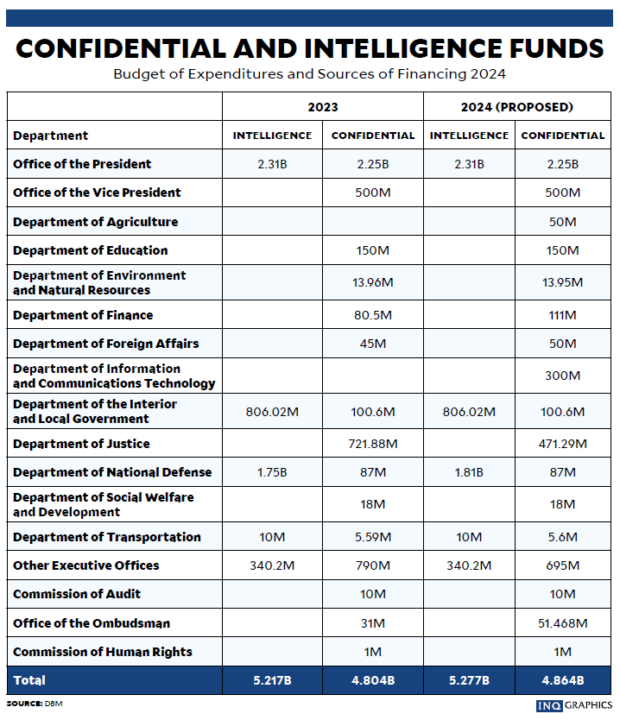President’s office seeks bulk of intel, confidential funds
MANILA, Philippines — The Office of the President (OP) is seeking P4.56 billion in confidential and intelligence funds for 2024—almost half of the P10.14 billion in secret appropriations tucked into the proposed national budget submitted by economic managers to Congress on Wednesday.
Once approved, the confidential and intelligence funds requested by President Ferdinand Marcos JR’ office will have been unchanged from this year’s allocation and slightly higher than in the last three years of the Duterte administration.
The Office of the Vice President (OVP), on the other hand, is asking for another P500 million in confidential funds on top of the P150 million in confidential funds sought by the Department of Education (DepEd).
The two offices under Vice President and Education Secretary Sara Duterte received the same allocations this year.
Article continues after this advertisementThe 2024 National Expenditure Plan (NEP), or the budget document prepared and submitted by the executive to the House of Representatives and the Senate for approval, earmarked P4.86 billion for confidential expenses and P5.28 billion for intelligence expenses, representing less than 0.02 percent of the proposed P5.77-trillion national budget.
Article continues after this advertisementNext year’s proposed confidential and intelligence funds are higher by about P120 million than the P10.02-billion allocation for 2023.
Besides the OP, other agencies with the largest requests for secret funds were the Department of National Defense with a combined P2.68 billion in confidential and intelligence expenses, the Department of the Interior and Local Government with P906.62 million, and the Department of Justice with P471.29 million.
Corruption source
Confidential and intelligence funds are earmarked for surveillance-related activities of civilian government agencies. But the grant of such funds has been widely criticized as a source of corruption because the appropriations, by their nature, are not subject to the usual audit by the Commission on Audit.
State auditors have noted that these secret funds are difficult to examine since they are generally used for surveillance and intelligence-gathering activities related to national security and peace and order.
The release of intelligence funds is subject to the President’s approval. Agencies using these funds are required to submit a quarterly accomplishment report on the use of the funds.
Confidential funds, on the other hand, are released upon approval by the secretary of the department concerned. The agency is also required to submit a quarterly report on the use of the funds.
Based on the NEP, the OP is again eyeing the largest chunk of secret funds next year—P2.25 billion for confidential expenses and P2.31 billion for intelligence expenses.
In the last half of Rodrigo Duterte’s government, the OP received P2.25 billion each in intelligence and confidential funds for a combined P4.5 billion.
The amount had ballooned from the P500 million in secret funds given to the OP during Benigno Aquino III’s presidency.
As for the OVP and DepEd, this year was the first time both agencies received huge confidential funds.
During the 2023 budget deliberations last year, the Senate had cut down DepEd’s share to P30 million and realigned the amount to other departments.
But the bicameral conference committee later restored DepEd’s confidential funds despite criticisms that they were unwarranted in an agency that was not directly involved in law enforcement and security.
‘Excess fat’
At a press briefing, Budget Secretary Amenah Pangandaman assured the public that government agencies would strictly follow guidelines for the disbursement of confidential and intelligence funds.
Independent opposition Rep. Edcel Lagman of Albay stressed that Congress should exercise its power of the purse and “excise any budgetary fat, whether overtly or covertly hidden in the NEP.”
“I will pursue my advocacy against the profligate allocations for confidential and intelligence funds in the President’s 2024 NEP, the excess fat of which must be excised and reallocated to socioeconomic services, particularly education and health,” he said in a message to the Inquirer.


